
Tunisia Odyssey: Historic North
Bicycle Africa / Ibike Tours
Dispatch 5 - Tabarka
 The
route was again rural, but more populated than yesterday’s. We passed under
an impressive railway bridge that arched its way across our road and the
small river alongside. Even shrouded by fog, most of us found this to be a
photo-op.
The
route was again rural, but more populated than yesterday’s. We passed under
an impressive railway bridge that arched its way across our road and the
small river alongside. Even shrouded by fog, most of us found this to be a
photo-op.

 At
about twenty kilometers the fog was gone. We had been going up and down
gentle hills to this point, but now we had entered into a river valley and
were following it on its gentle downhill course.
At
about twenty kilometers the fog was gone. We had been going up and down
gentle hills to this point, but now we had entered into a river valley and
were following it on its gentle downhill course.
 The
road was now good, the weather cleared, the temperature was cool, all
metabolic functions were operating smoothly and we had a gentle downhill
through a spring-green valley. Hmmmm. Life was good.
The
road was now good, the weather cleared, the temperature was cool, all
metabolic functions were operating smoothly and we had a gentle downhill
through a spring-green valley. Hmmmm. Life was good.
This last twenty kilometers into Nefza were as nearly perfect riding as one could desire.
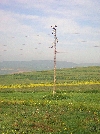 Most
of us had already seen a plethora of storks and together we saw at least
Most
of us had already seen a plethora of storks and together we saw at least
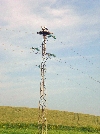 a plethora and a
half . Generally they were at their nests atop platforms that graced most of
the power cable towers along the valley. Many were feeding their young and
we saw a few swooping from their nests to drop to the river conveniently
located just below to re-provision their gullets with frogs, crayfish, and
minnows. These storks have it made. Life was good.
a plethora and a
half . Generally they were at their nests atop platforms that graced most of
the power cable towers along the valley. Many were feeding their young and
we saw a few swooping from their nests to drop to the river conveniently
located just below to re-provision their gullets with frogs, crayfish, and
minnows. These storks have it made. Life was good.
A little later, our new police escort pulled up; two guys who told us they were with security and we exchanged greetings. They followed us discretely into Nefza.
At Nefza we regrouped. As we entered town a policeman on a motorcycle came towards us, made a U-turn and led us through town. We acceptingly took advantage of the escort through the very crowded market area and then pulled up at a small café for thé and café au lait. It made a nice break in our day. Our escort probably felt like they were herding cats because there wasn't any communications between us about when we would start and stop. Lacking an entourage the police circled back, park, chatted among themselves (as did we) and waited for us. By this time it was clear that the police were keeping tabs on us as we traveled from place to place. Oh, well. And no, we didn't press our luck by trying to photograph them.

 The
rest of the ride as we headed to the sea at Tabarka was pleasant though not
as spectacular as the long valley ride into Nefza. Along the way,
The
rest of the ride as we headed to the sea at Tabarka was pleasant though not
as spectacular as the long valley ride into Nefza. Along the way,
 we
passed a lake, farms,
we
passed a lake, farms,
 vegetated
sand dunes, large chicken farms and lots of cork oak trees that had been
stripped long ago. We saw no fresh cuts. Also, the last few miles the odors
from
vegetated
sand dunes, large chicken farms and lots of cork oak trees that had been
stripped long ago. We saw no fresh cuts. Also, the last few miles the odors
from
 some
spring blossoms, possibly
some
spring blossoms, possibly
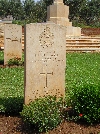 jasmine,
were sweet and strong adding to our biking enjoyment. We stopped briefly at
another commonwealth cemetery and then rolled into Tabarka.
jasmine,
were sweet and strong adding to our biking enjoyment. We stopped briefly at
another commonwealth cemetery and then rolled into Tabarka.
 Five
hundred Commonwealth soldiers are buried here. The US First Army was
stalled near here on their eastern advance in December, 1942. All
American casualties from the war are interned at the one US cemetery at
Carthage.
Five
hundred Commonwealth soldiers are buried here. The US First Army was
stalled near here on their eastern advance in December, 1942. All
American casualties from the war are interned at the one US cemetery at
Carthage.
 Accommodations
for the night were a very nice hotel for us with all the amenities and a
roof top patio with an unobstructed 180 degree view of the island, marina,
beach and coastline. The hotel staff didn't bat an eyelash at the
bikes and they were stored on the ground floor in a hallway.
Accommodations
for the night were a very nice hotel for us with all the amenities and a
roof top patio with an unobstructed 180 degree view of the island, marina,
beach and coastline. The hotel staff didn't bat an eyelash at the
bikes and they were stored on the ground floor in a hallway.

 Tabarka
is a delightful seaside town that seems about to lose its “quaint” status as
it is increasingly being discovered by tourista. The tourists
Tabarka
is a delightful seaside town that seems about to lose its “quaint” status as
it is increasingly being discovered by tourista. The tourists
 aren't
there in large numbers in
aren't
there in large numbers in
 April
because the sea is still too cold from the winter. But, it has miles
of beach which are increasing being lined with hotels, pizzerias, curio shops,
cafes,
April
because the sea is still too cold from the winter. But, it has miles
of beach which are increasing being lined with hotels, pizzerias, curio shops,
cafes,
 travel agents and a the
travel agents and a the
 other
indicia of a tourism Mecca. The annual July Jazz Festival with
headliners from Europe and America, which plays at several venues in town, is
also certain
other
indicia of a tourism Mecca. The annual July Jazz Festival with
headliners from Europe and America, which plays at several venues in town, is
also certain
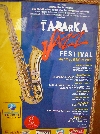 to
draw a crowd for its week long run. This moderately sized central town area already
has a disproportional number of restaurants for a town its size. In
the background, high end vacation housing is already beginning to climb up the
surrounding hills.
to
draw a crowd for its week long run. This moderately sized central town area already
has a disproportional number of restaurants for a town its size. In
the background, high end vacation housing is already beginning to climb up the
surrounding hills.
 Our guide also commented on how single mindedly Tabarka
has reinvented itself for mass international tourism since he started coming here two decades ago.
In the process it has regressively moved from quaint to ordinary.
Our guide also commented on how single mindedly Tabarka
has reinvented itself for mass international tourism since he started coming here two decades ago.
In the process it has regressively moved from quaint to ordinary.

 Tabarka’s
location is certainly magic. It lies on a wide, protected bay with an island
at the mouth for further protection, though Tabarka Island is really now a
peninsula as the intervening
Tabarka’s
location is certainly magic. It lies on a wide, protected bay with an island
at the mouth for further protection, though Tabarka Island is really now a
peninsula as the intervening
 strait has long
since been filled in. The causeway to the island also serves as one
side of the marina the moors fishing boats, a bit of the Tunisian Navy, visiting
yacht and a growing fleet of "pirate ship" for tourist excursions. Atop the
island stands an old Genoese fort with an interesting history, more on that in
just a bit.
strait has long
since been filled in. The causeway to the island also serves as one
side of the marina the moors fishing boats, a bit of the Tunisian Navy, visiting
yacht and a growing fleet of "pirate ship" for tourist excursions. Atop the
island stands an old Genoese fort with an interesting history, more on that in
just a bit.
 Tabarka
itself was originally a minor Phoenician port (8th C BC Thabraka - "Shady
Place). It came into its own during
Roman times (2nd C BC) exporting Chemtou marble. Many of the big cats,
captured in the extension of the Atlas mountains, that run parallel to the coast
just south of here, that were used for brutal entertainment in
Rome’s Coliseum, also left from this port. There are a few Roman era ruins in town and on the hillside, the
Tabarka
itself was originally a minor Phoenician port (8th C BC Thabraka - "Shady
Place). It came into its own during
Roman times (2nd C BC) exporting Chemtou marble. Many of the big cats,
captured in the extension of the Atlas mountains, that run parallel to the coast
just south of here, that were used for brutal entertainment in
Rome’s Coliseum, also left from this port. There are a few Roman era ruins in town and on the hillside, the
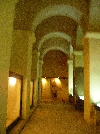
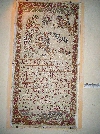
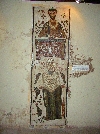 French Basilica is built over the
Roman cistern (19th C). In the 7th C it was attacked and destroyed by the
Arab fleet. The local scene got livelier again in the 15th C when the Barbarossa brothers (Corsairs)
took over from the then ruling Spanish and set up shop here. It seems that the Barbarossa's
lost their lease when they traded the island as ransom for their buddy Dragut to
a Genoa family in the
1544. The Genoese built the castle (and the French built causeway.)
In keeping with the theme of impermanence, the Genoans were expelled by
Ottoman Bey Ali Pasha in 1741. The next major shift in landlords was
when the French colonized Tunisia a little over a century later.
French Basilica is built over the
Roman cistern (19th C). In the 7th C it was attacked and destroyed by the
Arab fleet. The local scene got livelier again in the 15th C when the Barbarossa brothers (Corsairs)
took over from the then ruling Spanish and set up shop here. It seems that the Barbarossa's
lost their lease when they traded the island as ransom for their buddy Dragut to
a Genoa family in the
1544. The Genoese built the castle (and the French built causeway.)
In keeping with the theme of impermanence, the Genoans were expelled by
Ottoman Bey Ali Pasha in 1741. The next major shift in landlords was
when the French colonized Tunisia a little over a century later.
 During
the French tenior the major event seems to have been the exile to Tabarka of Habib Bourguiba
(1952) at the Hotel Les Mimosas and Hotel de France. This is commemorated
by a statue of Bourguiba in the central roundpoint.
During
the French tenior the major event seems to have been the exile to Tabarka of Habib Bourguiba
(1952) at the Hotel Les Mimosas and Hotel de France. This is commemorated
by a statue of Bourguiba in the central roundpoint.

 A
short walk to the west along a seaside promenade are the distinctly shaped
Les Aiguilles (the Needles) after which our hotel is named. These jagged
slivers of rock jut out of the Mediterranean in a small group on the west
side of the bay providing a popular photo op.
A
short walk to the west along a seaside promenade are the distinctly shaped
Les Aiguilles (the Needles) after which our hotel is named. These jagged
slivers of rock jut out of the Mediterranean in a small group on the west
side of the bay providing a popular photo op.
 A nice walkway continues to a
suburb of Tabarka on a point further west. While on the boardwalk we
were greeted by a man who showed me his “official” permit to sell pink coral
that grows offshore here. He then showed me a side bag full of pink coral
jewelry. The coral is endangered, and it is illegal to bring into the U.S.
A nice walkway continues to a
suburb of Tabarka on a point further west. While on the boardwalk we
were greeted by a man who showed me his “official” permit to sell pink coral
that grows offshore here. He then showed me a side bag full of pink coral
jewelry. The coral is endangered, and it is illegal to bring into the U.S.
Our supper at the hotel this evening was normal Tunisian cuisine, but one side dish was worth remarking on. They served a cooked carrot and caper dish that was the best carrot dish I’ve ever eaten. The capers were not as strong as those I’ve used in the States and the combination of tastes was magic, like little explosions of flavor as you chewed.
 Before
I sign off, it is worth noting how the cafes seem to have men (never
women) sitting at the sidewalk tables just about any time of day with all
seats facing the street like little chevrons with the table at the locus.
Before
I sign off, it is worth noting how the cafes seem to have men (never
women) sitting at the sidewalk tables just about any time of day with all
seats facing the street like little chevrons with the table at the locus.
 But as afternoon progresses, the café tables fill and for several ours the
ritual is fully realized. Greetings are very important with much hugging and
hand shaking all around when a new person arrives. It reminds me of the
ritualized hand clasping, grasping, and shaking that is constantly evolving
within our youth culture and which is often satirized. But here, the ritual
is in earnest and you violate it at your peril. For instance, you should
never just ask a shopkeeper for something. You first greet him, exchange
pleasantries, and then submit your request. I have witnessed some put downs
or subtle reminders of common courtesy on the trip when someone forgets the
greeting. We have all speculated on what the women are doing when all the
men are at the cafes. I suspect they have their own rituals behind closed
doors.
But as afternoon progresses, the café tables fill and for several ours the
ritual is fully realized. Greetings are very important with much hugging and
hand shaking all around when a new person arrives. It reminds me of the
ritualized hand clasping, grasping, and shaking that is constantly evolving
within our youth culture and which is often satirized. But here, the ritual
is in earnest and you violate it at your peril. For instance, you should
never just ask a shopkeeper for something. You first greet him, exchange
pleasantries, and then submit your request. I have witnessed some put downs
or subtle reminders of common courtesy on the trip when someone forgets the
greeting. We have all speculated on what the women are doing when all the
men are at the cafes. I suspect they have their own rituals behind closed
doors.
Another thing worth mentioning is the number of Publitel and "taxi phone" shops that grace the streets of small towns as well as big cities. These are places where one can place a phone call. The suspicion is there are so many because few people have/had private phones in their homes. However, with the number of cell phones we have been seeing, the Publitel business is can't be long for this world. It looks like this will be another instance of a country leapfrogging ahead with technology. Instead of wiring homes with landline phone connections, cell phones will make it unnecessary and impractical.
![]()
![]()
Unique Programs To Special Places For Memories Of A Lifetime!
![]()
![]() Please
write if you have questions, suggestions and comments about our program or want to be
added to Bicycle Africa's mailing list. (Also let us know how you found this site.)
Please
write if you have questions, suggestions and comments about our program or want to be
added to Bicycle Africa's mailing list. (Also let us know how you found this site.)



